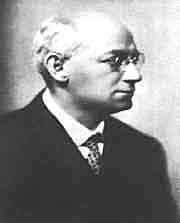Sigmund Freud And... |
Sandor Ferenczi
Graduate of medicine in Vienna, he became neurologist before obtaining the title of psychiatrist at the royal court.
Established in Budapest, he met Freud via a colleague, in 1908. Within the group of the pioneers, Ferenczi was the one to whom the most difficult cases were addressed. His great
sensitivity, his clinical intuition and spirit of adventure predisposed him to assume this difficult role. His experience with the treatment of borderline cases and pre-psychotics, in addition to his personal characteristics,
supported at Ferenczi the development of an original work, centered on the technique and all the clinical problems raised by these cases, almost on the limits of the analyzable.
His innovative spirit and his interest for the dared theorizations led him to develop, in collaboration with The work of Ferenczi, which consists especially of multiple short texts, has known for a few years a certain vogue with the French analysts, who discover a way to work out the
problems incurred by lethargic patients. His text on The Confusion of the Languages between Adults and Children (the language of passion versus that of tenderness) is probably the most frequently quoted.
It is remarkable that, if we simplify, for Ferenczi, the child is more or less pure and innocent, point of view often opposed to the vision of other analysts (one may thinks of Melanie
Klein) who allots to the child both good and evil feelings. Ferenczi, who was probably the closest of the collaborators of Freud, especially after the death of  Hungarian Sandor Ferenczi (1873-1933) had a complex psychoanalytical career, with the image of a man shining and
sensitive who did not scorn to venture on unexplored paths.
Hungarian Sandor Ferenczi (1873-1933) had a complex psychoanalytical career, with the image of a man shining and
sensitive who did not scorn to venture on unexplored paths.
--
Copyright René DesGroseillers
|
|
Home | Resources | Forum | Newsletter | Contact Copyright 1999-2024, AROPA. All rights reserved.
![]()